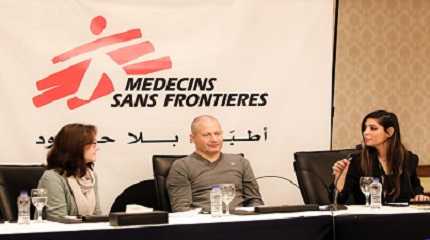
CAIRO, Jan. 20 (Xinhua) -- A medic from Doctors Without Borders, or Medecins Sans Frontieres (MSF), has given first-hand perspective about the challenges and experiences he had while working in a Gaza hospital during the Israel-Hamas conflict.
During a press conference held here Friday, Enrico Vallaperta, an Italian intensive care nurse with the MSF who left Gaza on Thursday, said he had worked in central Gaza's Al-Aqsa Martyrs Hospital for several weeks amid very tough and dangerous conditions.
"When I arrived at the hospital, there were 650 patients and thousands of refugees living in the hospital and between the hospital building and its external walls," Vallaperta told reporters.
He said the hospital was ordered by the Israeli army to evacuate 20 days after his arrival as the ground operation and bombing got closer, adding that evacuation orders were also sent to residential blocks 200 meters away from the hospital, making the situation riskier for the staff, patients and refugees alike.
"We could not continue to work in a safe context. Deciding to evacuate means taking the staff out and leaving patients inside because we can move 700 patients to nowhere as there is no safe place," he revealed.
"We decided to move to the south of the Gaza Strip. Two days later, we faced another difficult situation as a bomb was dropped at the shelter where some of our staff and their families lived, yet fortunately, the bomb did not explode," Vallaperta recalled.
However, he said the daughter of one of the drivers of the MSF was killed in the attack, affirming there would have been a mass loss of lives if the bomb exploded.
"I left the south Thursday. Over the past 10 days before I left, I held some activities to support hospitals in the southern area," Vallaperta added.
He stressed that the situation there is getting worse every day as getting food and healthcare is extremely challenging.
For her part, Helen Ottens-Patterson, MSF's emergency coordinator in Cairo, said MSF had provided medical services, including surgery, post-operative care, maternal health, pre-and post-natal care, in addition to physiotherapy, and mental health care, in several hospitals scattered all over the Gaza Strip.
"Our mission in Egypt is mainly to support our activities in Gaza with supplies," she added.
She noted that MSF had sent 107 tonnes of medical assistance into Gaza, most of which were medical supplies and food.
Meanwhile, Enas Abu-Khalaf, MSF head of communications for the Middle East, called for an immediate ceasefire in the Gaza Strip that will spare the lives of civilians, restore the flow of humanitarian assistance, and re-establish the healthcare system in the war-torn territory.
"After more than three months of the war, the suffering of Palestinians trapped in Gaza can no longer be put into words," Abu-Khalaf told reporters.
She noted that the indiscriminate Israeli bombing has destroyed buildings and entire neighborhoods in the Gaza Strip, adding that people in Gaza need a "sustainable ceasefire now."
"Attacks against hospitals and civilians must stop immediately. Therefore, working purposefully to reach a ceasefire is the most effective way to ensure this," Abu-Khalaf stressed.
Earlier this month, the World Health Organization (WHO) warned of a humanitarian and health catastrophe in the Gaza Strip as humanitarian space and access to medical services continue to shrink.
"Hospitals are closing, patients are lacking access to health facilities, health workers are being forced to flee for their safety," Sean Casey, WHO emergency medical teams coordinator, said during a United Nations weekly briefing via video link from Gaza on January 9.
Israel has been launching a large-scale offensive in Gaza to retaliate against a surprise attack by the Palestinian Hamas group on southern Israel on Oct. 7, 2023, when about 1,200 people were killed, according to the Israeli tallies.
The Palestinian death toll from ongoing Israeli attacks on the Gaza Strip has risen to 24,762, the Gaza-based Health Ministry said on Friday.




